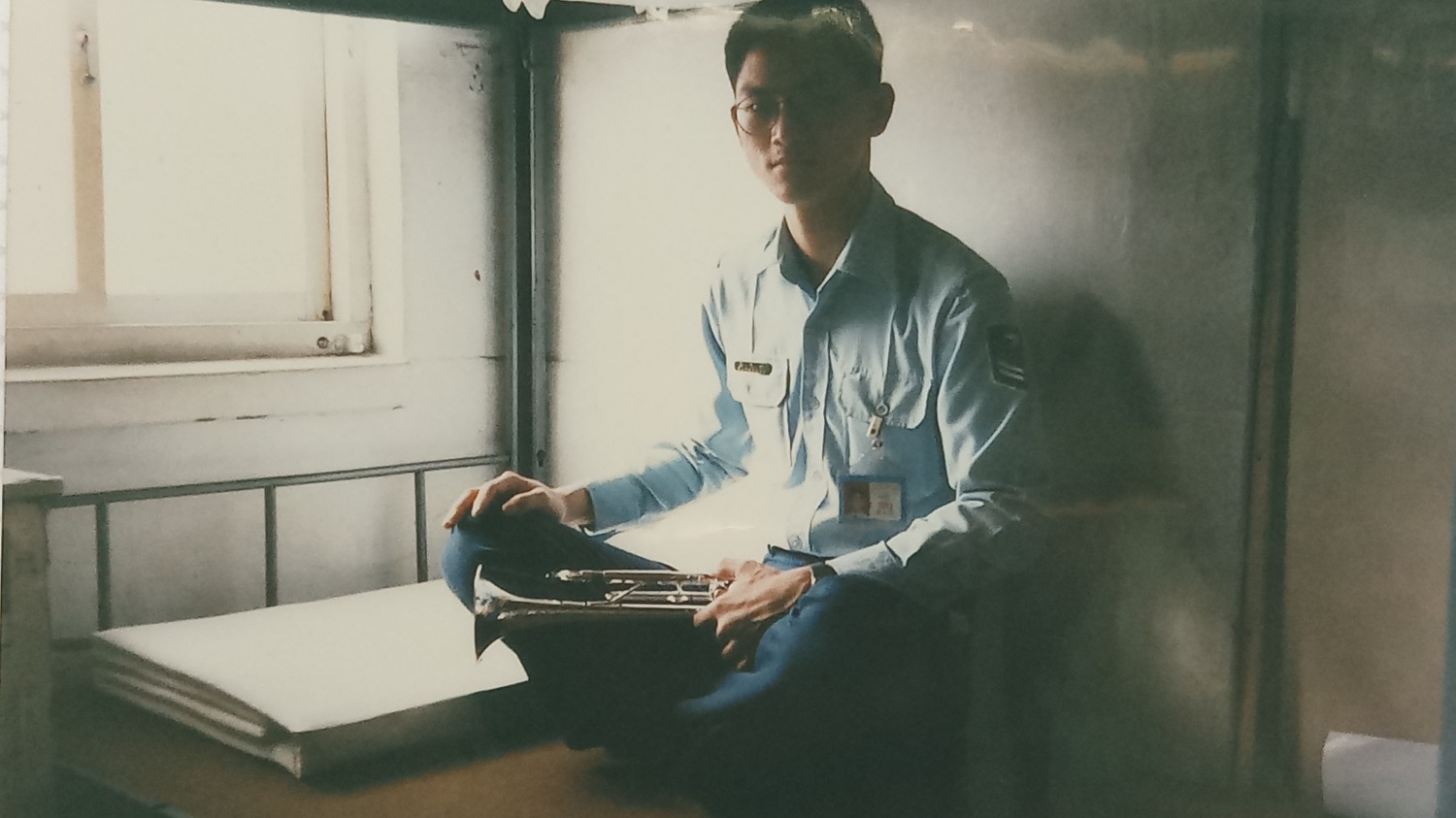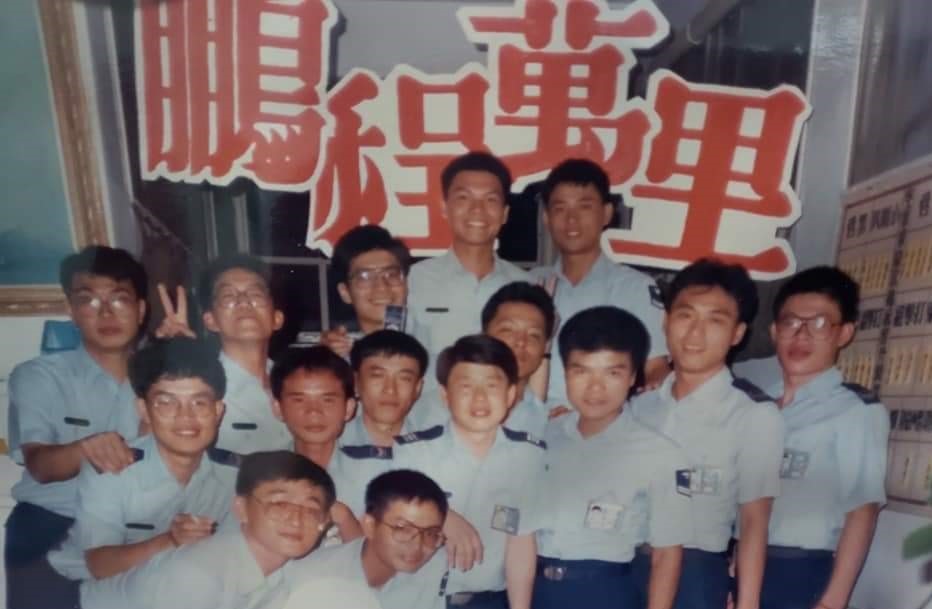目前作為員工辦公室的「C-LAB營運中心」是空軍總司令部時期的「軍樂大樓」,是空軍軍樂隊成員主要的活動空間。軍樂隊,乍聽之下一般人多半沒什麼共鳴,但如果知道歌手陳昇、脫拉庫樂團主唱張國璽、演員楊祐寧、亂彈樂團鼓手兼PIPE Live Music負責人童志偉等名人都曾是空軍軍樂隊的一員,在不同的時空背景中,他們都曾在C-LAB園區奏樂行進、升旗演奏、生活起居,菜鳥時都經歷過烈日下演奏樂器數小時不能亂動的操練。如此想來,對軍樂隊的印象瞬間生動有趣得多。當向來與外界隔絕的軍事基地重新被注入了人的故事,冷硬的水泥建物多了氣息,空間記憶重新鮮活了起來。
C-LAB於今年開始「空總共筆」計畫,透過既有資料的搜集彙整、人物訪談等研究方法,嘗試建立空總文史資料庫。關於空總的身世背景並非鮮為人知,網路鍵入關鍵字,很快可以得到「日治時代的臺灣第一個工業研究所」和「國民政府來臺後的空軍總司令部」,是這裡兩大發展關鍵;然而,除卻這樣的輪廓線,我們對於其中的生活紋理知之甚少。為此,訪談曾經駐留此地的人,挖掘他們的經驗和回憶是一項重要的工程;此外,還需要許多曾經和空總有所交集的人能主動提供自己的故事,填補大片在既有路徑之外的留白場景。
那些場景描繪起來或許沒那麼複雜,可能是你的(前)男友曾經在此服役,會客室有著你們的愛情故事;或者你曾經隨團來此勞軍,中正堂因為你們的演出而歡聲雷動;甚至是距今最遙遠的「工研醋」年代,可曾有人還保有當時的片段回憶?這類小人物的視角總被傳統的歷史大敘事所忽略,卻恰恰是書寫生活史的吉光片羽,蘊含細膩真摯的情感,也是當代所珍視的異質多元性。也因此,此計畫命名為「空總『共筆』」,邀請公眾一起書寫,讓敘事不會只有特定角度,將空間的話語權開放給所有與之有關的人;「空總共筆」網站在6月1日正式上線,邀請民眾上傳圖文影音,記錄自己與空總的往事。
 1990年代,軍樂隊成員林志堅攝於軍樂隊宿舍,「不管再怎麼累,都要小心呵護豆腐被」。圖/空軍樂隊之FB分隊提供
1990年代,軍樂隊成員林志堅攝於軍樂隊宿舍,「不管再怎麼累,都要小心呵護豆腐被」。圖/空軍樂隊之FB分隊提供
此計畫二年起跳,研究團隊的目標不僅僅是拼排出空間生活史,更希望能從這些行為模式、現象中梳理出文化研究的主題。以中正堂為例,通常用於軍中休閒娛樂活動,研究團隊於是評估從勞軍文化切入的可能性。
早期演藝圈盛行安排女明星前往基地勞軍,如鄧麗君、方季惟、蘇慧倫等人都曾是知名的「軍中情人」,1990年代還可見劉德華、郭富城、葉蒨文等一線港星來臺勞軍演出。然而,這類娛樂性高的勞軍活動通常發生在部隊營區,空軍總司令部因屬性、位階不同,勞軍節目也有所差異。例如曾經某任總司令偏好京劇,中正堂舞台因此引進京劇節目,其他如名人演講等偏向藝文、教育性質的勞軍活動也會在空總發生,但在部隊營區就比較少見。從勞軍文化的對照中能看見性別凝視、階級差異與時代變遷等議題,倘若相關資料累積足夠,即可以文化研究的方法進一步深入。
自計畫進行以來,C-LAB研究員汪怡君在不同的人物訪談中留意到一群面孔模糊的老兵。她表示,許多受訪者在講述自己在空總的故事時,往往會提到住在裡頭的老兵,推測起來應是當年隨國民政府撤退來臺的外省軍人,晚年孤身一人亦無家可歸,因此退役後仍住在園區宿舍內。他們是彷彿不存在的存在,默默在園區生活,一個人到聯合餐廳吃飯,默默在房間養鴿子,最後孤獨在床上死去,甚至主動結束生命。然而這些想像起來無比悲傷的情節,卻只存在講述者故事背景裡的一小角,截至目前沒有人具體知道他們是誰?從哪裡來?為什麼住在這裡?他們有多孤獨?
在空總任職的官兵大約三、五年輪調,因此不太容易有機會和這些久居又邊緣的老兵建立長遠的互動關係,於是這些老兵只佔受訪者一、二句話的份量,「這個角色這麼輕、這麼薄,但都會被提到。」要找到能談深入此主題的人也因此難度很高,不過當「空總共筆」公開徵集上線後,會不會有更多人提到這群老兵,甚至會有認識他們的人?如此或許就有機會拼湊出一個更清晰樣貌。這些小人物是時代變動的縮影,為其留下紀錄不僅是為這些孤單的生命留下一個身影,更反映當代社會面對歷史的態度。
 1986-1987年,在軍樂大樓精心佈置,歡送退役的軍樂隊成員。圖/空軍樂隊之FB分隊提供
1986-1987年,在軍樂大樓精心佈置,歡送退役的軍樂隊成員。圖/空軍樂隊之FB分隊提供
「空總共筆」絕非只是為這座場域書寫編年紀事,更在涵納空間裡人的故事。臺灣自1990年代開始實踐「閒置空間再利用」,迄今有為數眾多的舊空間被賦予新生命,然而在空間文史的梳理上通常只完成硬體發展沿革的大事紀,尚未見將資源投入在紮實建構場域的生活史,甚至進一步解析其所體現的文化意涵。「空總共筆」未來將成為一個開放資料庫,任何人可以從這些文史基礎上再發展,不管是作為研究題目,作為藝術創作的素材或改編成故事文本等,具有無限可能。今年將首先舉辦「策展工作坊」,由參與者運用資料庫素材自行策畫一個展覽,並安排專業策展人講授指導,作為該計畫的階段性成果展現。